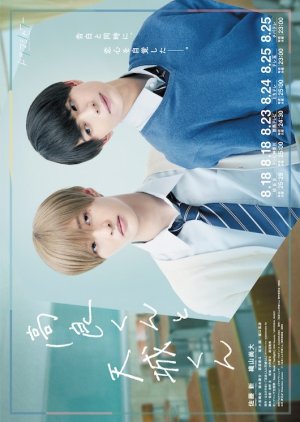
Această recenzie poate conține spoilere
Great Slice of Life BL
Takara-kun to Amagi-kun (2022) was great because they used defined tropes (cold, stoic guy with cute, funny guy) and brought life to the characters. My biases are, rural setting, slice of life, and odd couples, so I was bound to love it, but the acting, the setting, the friendships put this over the top.Yes, like most Japanese BL, the intimacy scenes are not very natural, but what I did enjoy was, when one character stated his boundary, and need to move slowly, his partner respected this.
I will be rewatching this due to the overall package this series is. It may be too slow for some viewers, but it was like wrapping a gift for me.
Considerați utilă această recenzie?

Cute and quirky.
Cute, cringe-worthy, hot in a vague way, over-the-top in other ways, but ultimately endearing and human. As in many Anime/BL works, high school is a useful construction for exploring human communication around feelings. But this series seems more sophisticated than most. Love the way competing inner monologues show the vast gaps in perception. Low self-esteem, excessive concern for others perceptions, fear of rejection, impact of childhood on ability to accept love. Some reviewers complain that nothing happens, but what is happening is entirely inside the characters heads. Characters develop a depth of love, learn what they need to do in order to build and maintain their relationship. Develop a larger definition of love that stretches beyond their own needs and even their own relationship. Love that Katori is the voice of the author/adult in the room, gently advising the characters, providing hints to the audience , and making vague snarky comments about the genre. Realistic ? No. But that's not the point.Usually, conflicts in BL seem improbable, that real adults would never have those sorts of misunderstandings over such trivial matters. But in this case, around episode 6, I came to the embarrassing realization that I still think the way Amagi does, even at 3x his age. I wonder whether its just me (probably), and that for others, the typical BL misunderstandings are real to them.
One way to interpret Amagi's skipping around with arms waving and his continuous talking is as hyperactivity, and his constant running away (giving up) as rejection sensitive dysphoria (RSD).
Maybe because I related so much to Amagi, I have a certain awe for a series that can speak to me across generations as well as cultures. Thank you Yoshino-san, Oriyama, Sato, Suzuki, Komiya and rest of the cast and crew.
Also, loved the slow beat dance club music brought out whenever there is sexual tension between Takara and Amagi. It was subtle but delightfully camp.
Considerați utilă această recenzie?
Apaixonada por BL
0 oamenii au considerat această recenzie utilă
Această recenzie poate conține spoilere
Um clichê gostosinho
Apesar de não ser uma grande produção, é uma história linda, fofinha, cheia de clichês e sem grandes polêmicas, porém que traz reflexões interessantes.Num primeiro momento, não gostei do personagem Takara. Ele me pareceu esquisito, arrogante, frio e distante ao extremo, desnecessariamente extremo... depois do primeiro episódio, quando eles decidiram "namorar", minha visão mudou completamente. Eles decidiram namorar sem fazer ideia do que era um namoro. Apesar de parecer maduro, Takara é apenas um adolescente sem experiência nenhuma, conhecendo o mundo e descobrindo seus próprios desejos, assim como Amagi, a única divergência entre eles é a personalidade, que em Amagi é doce e animada.
Passei a analisar dois garotos, ambos na puberdade, que já é uma época muito confusa, que de repente se veem atraídos um pelo outro e não sabem o que fazer com esse sentimento. Apesar da história ser narrada por ambos, os personagens não conhecem o pensamento um do outro, e apesar do desejo ambos temem cruzar a linha e se magoarem. Um dos casais mais saudáveis que já vi, pra eles, o sentimento do amado sempre vem primeiro, o problema é que muitas vezes eles entendem o sentimento do outro errado, ou julgam algo sem perguntar, por medo ou vergonha.
Gostei muito do amigo de Amagi, super observador e conseguiu entender tudo desde o começo sem precisar que ninguém falasse nada sobre o romance dos dois.
A atuação não foi perfeita, mas não foi ruim. A ost é linda e a fotografia da série é bem feita.
Com certeza indico essa série, são apenas 8 episódios de menos de 30 minutos, super gostosinha e aconchegante.
Considerați utilă această recenzie?

Această recenzie poate conține spoilere
Mignon tout plein, sans beaucoup plus
Découpé comme un manga, ce drama est plus proche du "shounen ai" que du "yaoi".Les personnages représentent ce qu'il y a probablement de plus choupi dans les mangas BL. Une opposition de caractère entre le seme/uke, assez habituelle, un problème de communication, assez habituel, tout cela dans le cadre du lycée, assez habituel. On déjà vu ça un million de fois, mais ça fonctionne bien, probablement grâce aux acteurs qui sont presque plus adorables que les personnages qu'ils représentent. Une petite amélioration du jeu d'acteur serait néanmoins appréciable.
La série se voit très rapidement, presque trop, quelques épisodes/chapitres de plus auraient été bienvenus.
Un petit clin d’œil au personnage secondaire de Tanaka/Komika Rio, drôle et charmant, qui mériterait sa propre série (BL).
Tout cela donne un petit drama bien sympathique, comme le manga duquel il est tiré, qui sort du lot par son côté mimi. Cela reste quand même très convenu dans la conception et la réalisation.
Considerați utilă această recenzie?
GOSTOSINHA PARA PASSAR O TEMPO
É aquele tipo de história que retrata o primeiro amor de uma forma mais pura, as coisas vão acontecendo na escola pra eles descobrirem que se amam de verdade.Não é uma obra de arte mas é boa, é curtinha e gostosinha de assistir para relaxar e para passar o tempo.
Takara Shun é lindo, sua personalidade que me agrada muito e Taichi Amagi é muito fofo, eles definitivamente combinam.
Considerați utilă această recenzie?

Această recenzie poate conține spoilere
Che bellezza sta serie, sono stra emozionata.L’ho iniziata perchè ne ho sentito parlare molto bene e devo dire che lo rifarei altre mille volte.
In generale devo dire di aver amato tutto o quasi ahaha perchè sì, c’è del cringe e non poco ma vabbè alla fine sono veramente carini assieme quindi dai non penso troppo al cringe.
Il modo in cui si sono fidanzati è stato così casuale e veloce che non ci stavo credendo ma poi mi sono ricordata che questo è un bl giapponese e quindi ho capito che così è, lo dico perchè a livello di mie esperienze con i bl giapponesi, la maggior parte sono tutti così dannatamente veloci, non ti fanno mai realizzare nulla ahahah.
Poi vabbè nella loro relazione c’è sempre stato un pò di imbarazzo ma è anche normale che carinii, poi anche troppi fraintendimenti perchè comunicazione craccata ma tutto bene dai.
Alla fine, nonostante quei fraintendimenti, si sono sempre chiariti al meglio e ciò è stato veramente bello.
Per me il fell harder della situazione è Takara, assolutamente lui, che poi entrambi hanno una personalità che oltre a essere l’uno l’opposto dell’altra, sono anche molto strane ma vabbè questa cosa è un altro must have dei bl giapponesi ahahah.
Anche se in realtà Amagi è molto capibile, porello ne ha passate molte e ciò ha definito in particolare la sua personalità, pensa sempre troppo, si fa troppi problemi e si dà troppe colpe inutili.
Vabbè non ho molto da dire quindi concludo dicendo che ho un enorme crush sin dal primo ep per Takana, amore mio quanto bello, poi amatissimo anche il migliore amico di Amagi che è stato un ottimo cupido della situazione. Consiglio vivamente la visione di questa serie.
Considerați utilă această recenzie?
thereluctantshoweater
0 oamenii au considerat această recenzie utilă
Bask in the youthful sunshine of dreams
It is really hard to watch this without grinning! There are no high-stakes here other than the beautifully blown-up agonised imaginings of the teenage mind. Lots of fluff, hugs, smiles and super supportive best friends and allies cheering them on.You can see Japan take cues from the sleekness of K-drama here, but still retaining the moody colours of the Japanese aesthetic. The boys are styled to a T even in their school uniforms but their bedrooms still look like teenage rooms - I find the interior designed bedrooms of K and C drama Land pretty unrealistic so it’s nice to see the balance here, it really helps the world building feel more genuine.
This is a warm nostalgic breeze of a show that highlights the sweetness of first love without the drama and toxicity of high school. Perhaps it is a utopia that doesn’t exist, but it is so nice to imagine a universe where this could happen, preferably one where Takara and Amagi can bashfully smile at each other forever.
Considerați utilă această recenzie?

IncorrigibleMe
0 oamenii au considerat această recenzie utilă
Această recenzie poate conține spoilere
Good story with disappointment as it could have great
The story revolves around 2 guys at school that meet, fall in love, suffer minor hiccups in their relationship and stay together at the end. Takara (Sato Arata) is the silent type that really cares about his significant other and is out there to help and protect him. Amagi (Oriyama Nao) is the cute, energetic kind that has his small circle of friends and enjoys every moment. He also is in love with Takara and is not not shy about voicing his true feelings although is shy in certain other matters.Both the male leads share a great chemistry onscreen however that develops gradually and its not rather evident in the first couple of episodes. Special mention should go to supporting cast of Katori (Suzuki Kosuke) who plays the ever-helpful friend of Amagi and Tanaka (Komiya Rio) who plays the oblivious but caring friend of Takara. Katori especially plays an important role in helping the 2 leads to reconcile their issues.
Now its time to discuss the things that I didn't enjoy and the list might be long. Warning: Spoilers ahead
Ep. 1 begins with a conversation between a sorrowful Takara and a crying Amagi wherein it appears that there might have been an event due to which they are no longer in a relationship or on the verge of breaking up. This hooked me immediately as now I am intrigued to know what caused this . The scene moves to the past where we are introduced to these 2 characters and how they decide to start "dating". Now I assumed I will be taken through a journey detailing their days together and how their relationship develops further but to my utter surprise ,in a rush the issue from the beginning is revelead to just be a simple misunderstanding and they get back together. So all that crying and weeping for nothing. That could have easily been resolved by having a conversation.
And this is where the series lacks behind many other BL series with similar themes and storylines. These 2 ML do not seem to have a natural conversation. They just happen to meet daily at school, they greet each other and go into mundane topics that dont further the narrative but is just a filler to move to the next scene. Every episode is - Amagi has a simple conversation with his friends about something random, Takara and his friends talk about something generic. Amagi and Takara look at each other. Then they meet and have another conversation about something random.
So what pushes the narrative ahead if its not the dialogue between the 2 ML? Its voice-over narrations. Takara will look at Amagi and will go into a long winded voice-over narration about how he feels about Amagi or Amagi will look at Takara will have his own voice-over narration talking about the past. This is how the series progresses from one plot to the other. Its not a smart dialogue but these 2 reminiscing about something from their past.
In one of the episodes they show Amagi's past when he was a kid, ignored by his parents and that revelation and his understanding that he is always ignored and abondoned by people could have been used as a plot showing his constant need for validation from Takara about their relationship. They teased that possibility by showing Amagi speaking to Tanaka that he is the only one who is in love but nothing came out of it at the end.
On one hand we get to know about Amagi's childhood, but on the other hand we get no information about Takara. Many such opportunities of improving the story was available but it was not grabbed.I understand that this series is adapted from a manga and I have not read it so not sure if anything like this was mentioned in there. Purely judging the story presented in this series, I can state that it could have been done differently with a lot of new concepts introduced but sadly we didn't get that.
I would recommend it as a 1 time watch and should be seen especially for the supporting cast.
Considerați utilă această recenzie?

Această recenzie poate conține spoilere
Apresentação charmosa dos encontros e desencontros de uma paixão adolescente
“Takara & Amagi” é um dorama sem enredo, mas não no sentido negativo que essa definição geralmente carrega. É aquilo que chamam de “character-driven story”, ou seja, uma história em que o foco é maior (ou total) nas ações dos personagens principais, em como se sentem e na motivação interna que os impulsiona. Não há um acontecimento externo que os obriga a agir, todos os eventos que surgem na narrativa são causados pelos próprios personagens e, nesse dorama, podemos conhecê-los melhor ao longo dos episódios em momentos de introspecção. Então, se você não gostar dos personagens logo de cara, talvez não irá curtir a história.A primeira palavra que surge em mente quando tento definir esse dorama é “charmoso” — tanto que tive que colocar no título da resenha. A forma que os elementos narrativos são expostos, como a história se desenrola, as interações entre os personagens e a construção das cenas, tudo é muito bem integrado ao ambiente escolar e cria uma essência jovial que transparece ainda mais através das performances. Essa é a principal origem do charme, que é perceptível até mesmo em personagens mais apáticos como o Takara.
Desde o primeiro episódio somos apresentados à dinâmica do casal principal que se estende até o final. Amagi é o menino inseguro que tira conclusões precipitadas e tenta fugir de qualquer conflito. Takara é o tipo de pessoa que não expressa seus sentimentos de forma clara, deixando muitas brechas. Com isso, eles se retroalimentam de maneira negativa: o que o Takara não diz, o Amagi inventa e toma como verdade, e se essa “verdade” é confrontada, ele sai correndo (literalmente). No entanto, no restante dos episódios vemos os protagonistas tentando descobrir a melhor maneira de navegar por esses sentimentos, como agir com o outro, como comunicar o que estão sentindo, impor determinados limites, etc…
Resumindo, essa é uma história sobre dois adolescentes que ainda estão aprendendo a estar num relacionamento amoroso, descobrindo o que significa “namorar” — o Amagi, principalmente — e como a relação dos dois afeta seus respectivos círculos sociais no colégio.
Sobre os pontos fortes do dorama, não posso deixar de mencionar os momentos em que Takara, Amagi, Katori e Tanaka interagem entre si. É muito legal ver suas personalidades batendo de frente. Infelizmente, esses momentos são poucos, mas muito satisfatórios mesmo assim. Nesse sentido,“Takara & Amagi” é um bom exemplo do quanto personagens secundários podem ajudar uma história.
A direção é um outro ponto positivo. Existem cenas maravilhosas que seguem o famoso “show, don’t tell”. Por exemplo, ao invés de dizer como os personagens estão se sentindo, as suas reações para determinadas situações são exibidas. A exposição é puramente visual em vários momentos e isso é maravilhoso, já que não somos burros e podemos deduzir a partir das expressões faciais dos personagens, não é? E, além disso, as cenas em que todos os personagens estão enquadrados, um num canto da tela e o outro no canto oposto reagindo às ações um do outro, são as melhores!
Por incrível que pareça, a caracterização do Takara é a mais interessante do dorama. Ele é apresentado como uma pessoa distante, “um menino frio da era do gelo” quase sem expressão facial (não é questão de atuação, é só o personagem mesmo; um ponto muito bem exemplificado pelo 3º episódio) e incapaz de ter discussões minimamente profundas, como quando pula fora de uma conversa sobre Sócrates. Porém, é uma questão de aparências, uma persona que ele adota para conseguir se encaixar e obtém bastante sucesso nesse objetivo, até se apaixonar por Amagi. Após a percepção da paixonite, Takara se mostra muito poético, refletindo sobre seus sentimentos de maneira metafórica, afirmando que o sorriso de Amagi era como algo trazido pela primavera e que sua paixão foi crescendo gradualmente como a luz do sol que derrete a neve. Quando se apaixona de vez, diz “Sakura está em plena floração”. Quando quer ser mais direto sobre seus sentimentos para Amagi, diz “Eu sempre quero abraçá-lo de frente e não por trás”. É, mesmo sendo o menos expressivo, Takara acaba sendo o mais interessante.
O Amagi também possui seus momentos de desenvolvimento, especialmente para justificar alguns de seus comportamentos e apresentar a origem de sua insegurança, mas tal exposição é menos orgânica que a do Takara. Se mostrassem as cenas de flashback da infância do Amagi sem contexto, não ficaria surpreso se alguém achasse que são de outro dorama. Faz sentido para a história, mas implementaram com a mão pesada.
Katori e Tanaka não tem backstory, mas não é como se não houvesse um tiquinho de desenvolvimento para eles. Katori é o melhor-amigo-alma-gêmea do Amagi que o aconselha durante os perrengues e se torna o mediador de seu namoro. Tanaka é o cara de índole duvidável que cria um conflito na relação de Takara e Amagi, mas que também não chega a ser um monstro. Então, mesmo com pouco desenvolvimento, só o suficiente para não serem rasos, não é algo que chega a incomodar por conta das suas personalidades e pelos atores serem ótimos.
É uma história bem tranquila e gostosa de acompanhar. Consegue ser engraçada aqui, dar espaço para as emoções dos personagens ali e capturar uma lógica de pensamento que só faz sentido na cabeça de adolescentes e uma ingenuidade a respeito das relações amorosas por pessoas que não conhecem tanto o mundo. Ao assistir o dorama, adentramos meio que em uma dimensão paralela onde esses personagens vivem, regida pela lógica da juventude e seus desejos imediatos — já que adultos mal aparecem ao longo dos episódios, jogando o holofote na visão de mundo dos mais novos e como eles pensam que as coisas deveriam ser. Ou seja, Takara e Amagi estão tentando construir o seu “para sempre” no próprio mundinho deles. Os meninos raramente pensam a longo-prazo sobre o relacionamento, nem mencionam como ou se contarão para seus responsáveis, mas está tudo bem, já que estarão juntos. Para os dois, isso é o que importa.
~ ~ ~ ~ ~ ~
Esse é um dos meus doramas boys-love favoritos e revi pela 4ª vez para escrever essa resenha. Assisti pela primeira vez no lançamento, quando os episódios eram lançados semanalmente e não tive a melhor experiência. Recomendo que maratonem “Takara & Amagi”, acredito que esta é a melhor forma de mergulhar nesse BL.
Um abraço!
Considerați utilă această recenzie?

A prosaic story about love
This is a bit of an unusual BL story that frankly I am not sure that I 'got' it. That does not make it bad; just a bit confusing. It is like watching Romeo and Juliet minus the death scene of course. They speak not as teenage boys but like they are performing in a theater-in-the-round. It is a rather enjoyable series to watch as it is so different even if I did not quite understand it. I was perplexed by it all yet completely taken in by the charm and oddly soft passion with each other. As I watched this series, I felt inexplicably somber.You can review my complete thoughts on this series at BLBliss.com.
Considerați utilă această recenzie?

Considerați utilă această recenzie?
aleluvshyunjin
0 oamenii au considerat această recenzie utilă
...
KAJAKAHJAHAJSHSKDHJHAJAJHSKSHDKSHKAHSJSGJSGSKAGKACSBSJDCNSHSJSHKAGALALALJSHJDGDKAGABSGNAGABGSNAGANVSJAVBSCSBSVSJGSJSGSJSGHSHDHDGDJDHSJSGAKAVKAHSKDGDHSKGSJABSGKSBAKAHNAHAKSVJSMSHSKSJGAKAHSKSHKAGSKSHJSGDKS8SBWIDBBMSISGSKHSNSVSYVECS SGJSCUJAKSHKSHDJDamolosblKALBSKDBDKBDKDJDNMDHDJJALSJKSHDKDHJDHDKDJDGKSHAKSHSKDJKDHDJSHSKHSKAHANBABSNSVSJNSVDNDHJDHDKDHJDHDJDHJDHDJHSNSHSJGSJAHAJKAKAJHSHKSJSJMANSBBSNSNBSBSNSVNSNKDHDNSBNSBDNDBMSHAKNAHSKHSKDDGKSHKAHSNHDKDHDKBDKAKJAKSHDKDHDKDJKDHDKDHDKDJKDJDHDKDHNDHDNDBDNNDVDKHDNDHDBBNKDNHSJDJBSJHSJDKHSKSHKALJAKSNDKNSHDKXJKDNNSLDHDKDBNDNZBKSJAKSHKDHDKDHYUNJINTEAMOHAKAGKSHSKDHDKHDKDGSJSGJDJSGSGJSNSGSKGAKHAHAKSGBSESTEFUEELPRIMERBLQVIYLOAMOJAKAJKAHSKDHKDHDKDHDKHDKDHDKHDKAKAKJAHSKSHHDJJDKHAKSJALGUIENROBELELAPERDONALIDADATAKARAKSKHSKDHDKHDKDHDKDGKDGSKGDJDHHSNDHConsiderați utilă această recenzie?
































